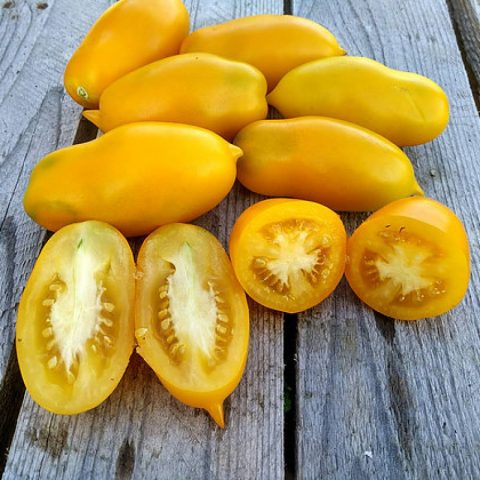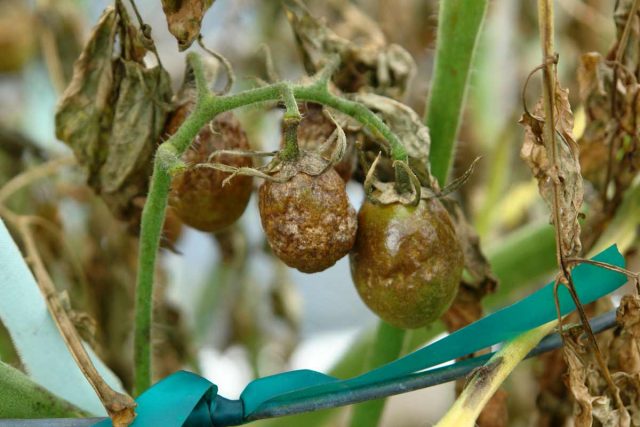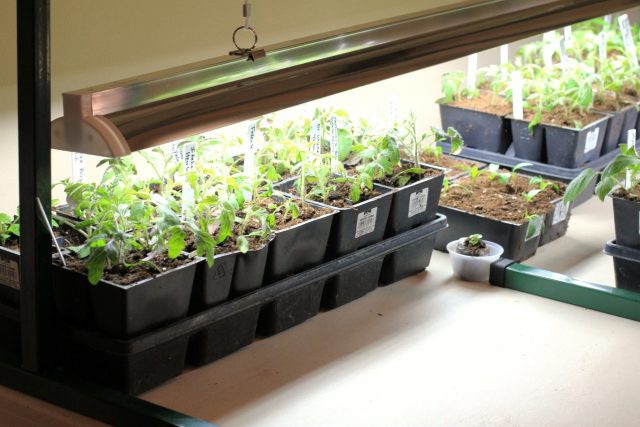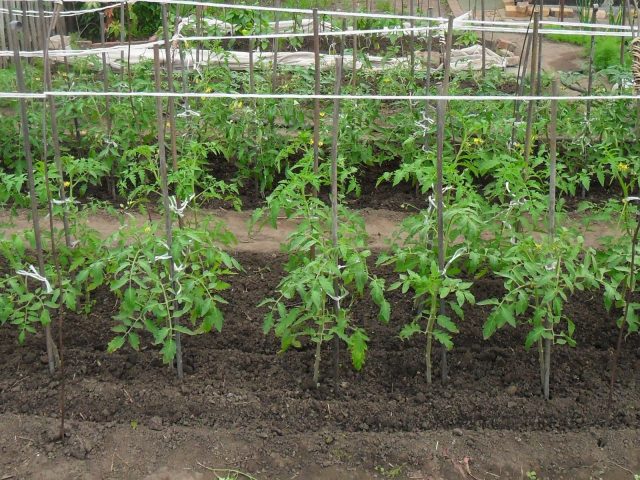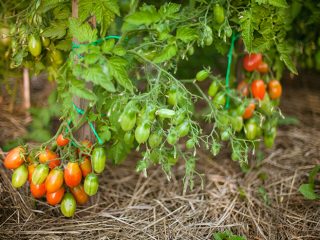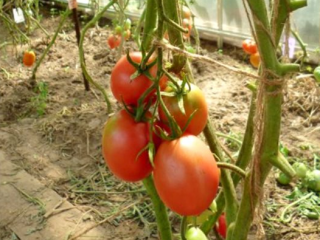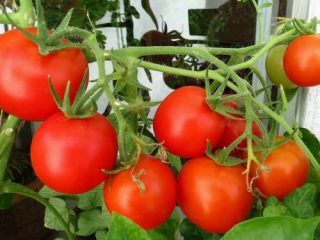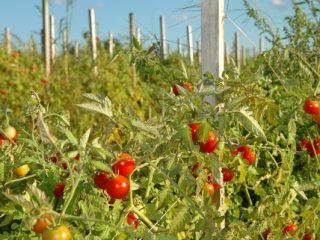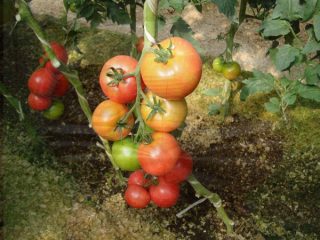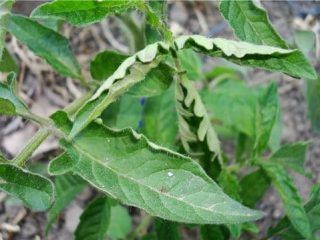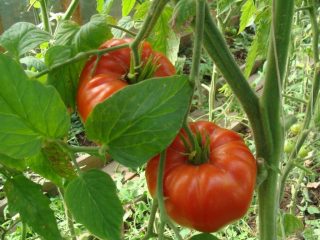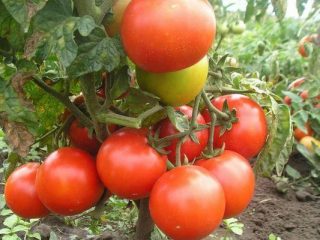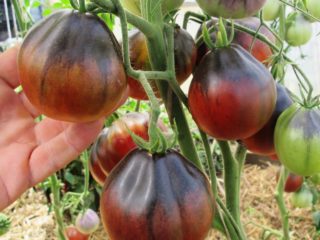Content
The Golden Rain tomato is a mid-season and high-yielding variety that is grown both in greenhouse conditions and in open ground. Among gardeners, tomatoes are known for their decorative fruits with high taste.
Detailed description of the variety
Golden Rain tomatoes are of the indeterminate type: they can reach up to 1.8 m in height. When the variety is cultivated in open ground, the bush grows up to 1.5 m. The main stem is powerful, but bends under the weight of the fruit, so the construction of supporting structures is necessary.
The leaf blades are medium in size and have a bright green tint. The tomato variety needs shaping and pinching: no more than 4 stems are left during the procedure. The inflorescence is simple.
Description of fruits
The Golden Rain tomato bush has complex clusters on which 6 to 8 fruits are formed, similar in shape to a pear. Tomatoes are green in color and change color to light yellow as they ripen.
According to the description and reviews, the Golden Rain tomato variety has a very rich taste: sweetish, with slight sourness and a pronounced aroma. The photo allows you to evaluate the tomatoes in cross-section: the seed chambers are separated by a dense partition, the pulp inside is very fleshy and juicy.
Varietal characteristics
The yield of the Golden Rain tomato variety depends on the care and method of cultivation: tomatoes that are cultivated in greenhouses are more fruitful. From one 1 m2 harvest up to 3-4 kg of vegetables.
Golden Rain tomatoes are sensitive to high humidity, so it is not recommended to grow them in places with heavy rainfall.
The variety prefers loamy or sandy soil, so soft soil rich in peat is not used when cultivating tomatoes.
The variety is resistant to the following diseases:
- tobacco mosaic;
- Alternaria blight;
- cladosporiosis.
With high humidity (more than 50-60%), the metabolic processes in the tomato are disrupted: the flowers are pollinated worse, fall off, and the plant’s immunity decreases.
Capable of infecting tomato seedlings Golden Rain black leg. The fungus is found in the soil, but when favorable conditions are created for it, it quickly multiplies and infects the stems of the plant.
The Golden Rain tomato seedling stops growing and the leaf blades curl.Dark spots appear on the stem at the roots, which leads to the death of the tomato within a few days.
The variety is also susceptible to late blight if the rules of agricultural technology are violated. The disease typically manifests itself in the second half of summer, when the nights become colder and air humidity rises.
Brown spots first appear on the leaf blades, but as late blight progresses, they spread to the tomatoes. Within a few days, the disease can affect all bushes, which quickly die from the fungus without treatment.
Advantages and disadvantages of the variety
Studying the strengths and weaknesses of the Golden Rain tomato allows you to determine the need to grow it in the garden.
The most valuable qualities of a tomato variety:
- decorative appearance of the fruit (elongated, yellow, small in size);
- versatility of use, preservation of presentation during transportation over long distances;
- the possibility of mechanizing harvesting due to the easy separation of the tomato from the stalk;
- high productivity;
- resistance to a certain group of diseases.
The disadvantages of the variety include the need for timely pinching and bush formation. It is important to provide the plant with proper care in order to obtain the maximum amount of harvest.
Rules for planting and caring for Golden Rain tomatoes
The choice of cultivation method for a variety depends on weather conditions and the capabilities of the gardener. In regions with cold and humid climates, it is preferable to grow tomatoes in greenhouse conditions. Under favorable conditions, a good harvest can also be harvested from bushes growing in open ground.
The optimal time for planting Golden Shower tomato seeds for seedlings is the beginning of March.Young plants are transferred to open ground at a temperature not lower than + 10 °C.
Planting seeds for seedlings
The first stage of growing the Golden Rain tomato variety is preparing the seed and containers.
For seedlings, soil rich in organic elements is selected, so it is preferable to use a mixture of manure, soil and compost from the garden, and peat. It is also possible to use specialized soil, which can be purchased at gardening stores.
Sowing of seedlings is carried out 60-75 days before transferring them to open ground; when cultivated in greenhouse conditions, the procedure is carried out earlier.
It is recommended to place the seed in peat pots or plastic cups so as not to injure the root system during planting in the garden bed.
Both the soil and tomato seeds must be disinfected. The earth is calcined in an oven or spilled with a solution of potassium permanganate. Seeds are treated with disinfectants and growth stimulants.
Caring for seedlings involves timely watering and controlling lighting. Seedlings need to be provided with a warm place accessible to sunlight, where drafts do not penetrate. To speed up seed germination, containers are covered with glass or film.
If there is a lack of lighting, use lamps that are left on for 18 hours a day.
Transplanting seedlings into open ground
7-10 days before transplanting into the garden, Golden Rain tomatoes must be hardened off. To do this, the containers with the plant are taken outside, gradually increasing the time they spend in open sunlight.
A bed is formed so that the variety is placed at a distance of 60 cm from each other while maintaining a distance between rows of 70 cm.
The earth is dug up and holes are formed, fertilizer is placed in them and watered well. The seedling of the variety is transferred to the ground and sprinkled with soil on top.
At the end of the procedure, the Golden Rain variety must be mulched with non-woven fiber or straw. This allows you to retain moisture in the soil and prevent active growth. weed.
Aftercare
Watering the Golden Rain variety of tomatoes must be done at the root so that water does not get on the leaf blades and stem. The frequency of the procedure depends on the climate: it is necessary to prevent the soil from becoming waterlogged or dry out. Greenhouses need to be ventilated regularly.
Fertilizing is carried out with preparations containing phosphorus, nitrogen and potassium. When choosing a specific product, it is used according to the manufacturer's instructions.
To prevent the stems from bending to the ground under the weight of the fruit, the Golden Rain variety needs a garter. It is possible to construct a trellis and use metal or wooden stakes.
Timely formation of the bush is mandatory. You can leave up to 4 stems, but fewer are allowed.
To prevent diseases, they are treated with Bordeaux mixture, all affected leaf plates are removed, and the condition of the plant is carefully monitored. It is important to regularly loosen the soil and inspect the variety for damage.
If signs of blackleg appear, the damaged seedling is immediately removed, the soil is disinfected and loosened, and watering is reduced. The stems and leaf plates of the Golden Rain tomato must be irrigated with biological fungicides: Fitolavin, Trichodermin. It is recommended to re-treat after 10 days.
To treat late blight, it is possible to use such agents as Fitosporin, Homom.
Conclusion
The Golden Rain tomato is preferred to be grown in southern countries: the plant is drought-resistant. In average climatic zones, high yields can be achieved by growing tomato varieties in greenhouse conditions. The fruits of the Golden Rain tomato have not only high taste, but also a decorative appearance.
Reviews

